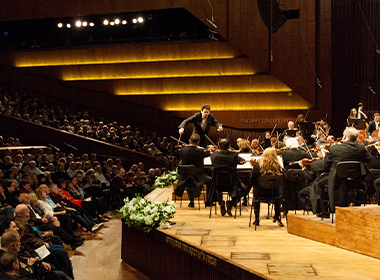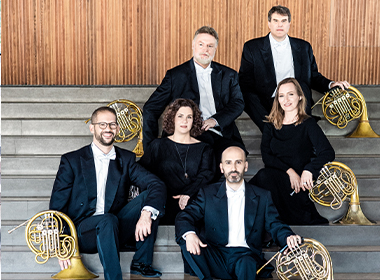Over 2,000 events are taking place around the world this year to mark the 100th anniversary of the birth of Leonard Bernstein, one of the greatest musicians of the 20th century.
The story of Bernstein‘s life is woven into the story of the IPO and the story of the State of Israel, from the legendary open-air concert he conducted in Be‘er Sheva in 1948 after its liberation for hundreds of tired soldiers, to his long-standing partnership with the IPO that lasted until his death.
To mark the 100th anniversary of Bernstein‘s birth, we are holding a festival dedicated entirely to his wide-ranging work. Bernstein‘s work spans a number of artistic genres, making for a celebratory and rich festival—featuring concerts, musicals, chamber works, lectures, a film and even a visit to the orchestra‘s archives.
The character of Leonard Bernstein the composer was and remains a mystery, an enigma, a code that requires deciphering. Bernstein—with a seemingly impossible connection between the physical and spiritual, hedonistic and extroverted on one hand, and able to melt hearts in masterful performances on the other; an American Jew who’s teacher and mentor Sergei Koussevitzky suggested, during the McCarthy era, that he convert, change his name, and marry; a man who properly understood the music of Brahms and Schumann, but who truly flourished when performing music written by another Jew and conductor (Gustav Mahler) and an introverted and oppressed ”Refuser” on the other side of the Iron Curtain (Dmitry Shostakovich)—chose to remain true to himself throughout his life. After his death, and after a number of detailed biographies written about him, there is still a sense that, like any mystery, only after his death will his music be able to tell us the true nature of this man.
One of the biggest questions that arises about Bernstein the composer is: ”when did he have time to write?” Since the days of Mahler and Strauss, there have been few composers to also become music directors. Who has time to be a director in the morning, conduct a concert in the evening, and postpone his creative urges until summer break? Bernstein in his own way managed to do the impossible. He became music director of the New York Philharmonic Orchestra in 1957, resulting from his success as a Broadway composer, where he created ”Candide” and ”On the Town” and was the first to build a true bridge between young people from America and around the world and the orchestra he led. Bernstein was optimistic and had a vision that the whole world would love music, and therefore, they would love him, Lenny. He tripled the number of subscribers to the New York Philharmonic in a year; offered free rehearsals open to the public; and created a series of youth concerts that drew 10 million viewers a week across the United States. It was a wonderful symbiosis between emotion and intellect. During these years, in which he led the orchestra, New York was considered to be one of the most prominent centers for concert music.
The love of the audience came easily to Bernstein. He only gradually gained the sympathies of the musicians with whom he worked, and with criticism he managed complex relationships until New York’s toughest critics were captivated by his charm. But Bernstein felt frustrated that he wasn’t accepted as an important composer in the symphonic world. Although he lacked opportunities to perform, record companies and orchestras all over the world, including the Israel Philharmonic Orchestra, opened their doors to his new scores. And though Bernstein was intriguing, the ”verdict” on his works was not determined while he was still alive. The next few years will be critical to his legacy. In the upcoming festival, his pieces will be conducted by a number of conductors, including a woman, all making personal statements. It will be interesting to hear new concepts about Bernstein’s music, detached from the way the composer used to conduct them.
Candide – Comic Operetta
”I first saw Bernstein conduct when I was 9,” says the well-known American conductor Marin Alsop. “I was in one of his youth concerts and from the moment he came on stage I was captured by the famous Bernstein magic. In my late twenties (she added in a Carnegie Hall interview), I was privileged to study with him, and the most special thing I learned from him was to tell a story through the music, if he did not know the story of a certain work, he would invent one, he said that we as human beings must have a story. We need a beginning, middle and end in the music to tell this story.” After her studies with Bernstein, Alsop developed an impressive career and is currently the music director of the Baltimore Orchestra.
The combination of a broad musical education, a deep understanding of the stage medium, and a wonderful melodic and orchestral ability characterize Candide.
The history of the work is interesting. It was originally written for Broadway between 1954 and 1956. With libretto by Lillian Hellman, the director of the original production was none other than Tyrone Guthrie. ”Candide” survived 70 nights on Broadway, a respectable amount of shows, but not enough to deem the work a ”hit.” It did, though, arouse enough interest for different versions to emerge through various attempts at reviving the musical. The concert version of the piece, which the IPO is performing, was created in 1988 for the Scottish Opera. Musically speaking, there are discernable elements usually identified with Viennese operetta, but are served here with the addition of Bernstein‘s ”spices”—jazz harmonies, energetic rhythms, and a rich orchestration full of percussion instruments. Listeners with a sharp ear may be able to identify familiar elements from ”West Side Story,” the composition of which coincided with the end of his work on Candide. Bernstein, who was torn between the concert stage and the ”light” stage, managed to create a fun and impressive mix in ”Candide” (years before his younger colleague Steven Sondheim did so with ”Sweeney Todd”) which is successful as a concert work, as heard in the ”Deutsche Grammophone” recording (in which he leads a cast that includes Jerry Hadley and Christa Ludwig).
Bernstein and Chamber Music
Bernstein was primarily a symphonic composer. Like the object of his admiration, Mahler, his chamber works reflect the desire of a mature Bernstein to play with friends.
The works that will be performed on the concert reflect three types of Bernstein‘s entire chamber output.
Early works: Bernstein wrote the piano trio when he was still a student at Harvard University in 1937. He later quoted a passage from it in ”Fancy Free.” The clarinet sonata was written in 1942 and is Bernstein‘s first published work. In these pieces one can identify influences of Copland and Ives, but the works are melodic, dramatic and accessible for the listener.
Arrangements: his cello meditation, which comes from Bernstein‘s monumental Mass and was arranged for the inauguration of the Kennedy Center for the Arts in Washington. Bernstein wrote the meditation at the request of his good friend, cellist Mstislav Rostropovich, who performed it many times around the world. The writing for cello in this piece is fantastic, and one can feel its strength and the physical and emotional power that Bernstein demanded from his performers. The piano part faithfully follows the orchestral score.
Songs for voice and piano: the fruit of Bernstein‘s great love for chamber music and accompanying singers; this was his way of ”participating” in music-making with his own hands (literally). Bernstein was saddened by the fact that his songs that became ”hits” on the concert stage were those whose texts were ironic and funny, like ”I Hate Music!” and La Bonne Cuisine.
Credits: This text uses passages from Norman Lebrecht‘s book ”The Maestro,” from the official website of Leonard Bernstein, and from Ms. Alsop‘s interview at Carnegie Hall.
Barber‘s famous Adagio was played at President Roosevelt’s funeral and later at events around the 9/11 Memorial. In Israel, the ”Angus Dei” movement of Bach‘s Mass accompanied the television broadcasts after the assassination of Yitzhak Rabin, now engraved in the memories of many. Bernstein himself conducted an emotional rendition of Beethoven‘s Ninth Symphony after the fall of the Berlin Wall. This is music that connects to history. The Kaddish Symphony found a similar fate. Bernstein composed the work—music and text—in 1963 and was in the final stages of editing when he learned of the assassination of President Kennedy in Texas. He decided to dedicate the symphony ”to the beloved memory of John F. Kennedy.” Influential in Bernstein‘s decision was the text of the Kaddish prayer sung in the work. It, as is well known, bears no mention of death, but instead references the word ”life” and gives ”praise” to the Almighty. To these, Bernstein added his own texts. Over the years he rewrote the text into an argument, sung and spoken between man and God, reflections on faith, doubt and morality.
Kaddish – Symphony No. 3
The world premiere took place in Tel Aviv in 1963, under the direction of Bernstein himself, with the IPO and actress Hanna Rovina. Bernstein dedicated the work to the memory of John F. Kennedy, who was assassinated shortly before the premiere.
The guest cast, together with the orchestra, includes an impressive Israeli team full of worldwide success: conductor Ilan Volkov, singer Chen Reiss, and actor Itai Tiran, alongside the Gary Bertini Israeli Choir, the Jerusalem Academy Choir, and the Anchor Choir.
Ilan Volkov is a world-renowned conductor who is at home with all kinds of music, an ideal choice to conduct a multi-style work like Bernstein‘s Kaddish. Chen Reiss is undoubtedly today’s leading Israeli singer on the world stages, and Itai Tiran returns to collaborate with the IPO as an actor/narrator. It is a worthy trio to follow the original cast, which gave the world premiere here in Tel Aviv with Bernstein conducting and singer Jenny Tural and actress Hanna Rovina. They join a prestigious list of Kaddish performers, including Felicia Montealegre, Bernstein‘s wife; the singer Montserrat Caballé; violinist Yehudi Menuhin; and actress Claire Bloom.
Articles about Bernstein:
Kaddish – Bernstein’s Third Symphony
Ilan Volkov, conductor
Chen Reiss, soprano
Itay Tiran, actor
The Gary Bertini Israeli Choir directed by Ronen Borshevsky
The Jerusalem Academy Chamber Choir directed by Stanley Sperber
The Joshua Tuttnauer Ankor Choir of the Jerusalem Academy of Music and Dance directed by Dafna Ben Yohanan
Excerpts from the films "The Gift of Music" and The Love of Three Orchestras"
Bernstein: Symphony no.3, "Kaddish"
Leonard Bernstein: The Musicals
Yaron Gottfried, conductor
Meshi Kleinstein
Harel Skaat
Theo Hoffman
Tali Ketzef
Daniela Skorka
Greatest hits from his musicals, including: West Side Story, On the Town, Candide
Candide - Comic opertta
Marin Alsop, conductor
Jane Archibald, soprano (Cunegonde)
Nicholas Phan, tenor (Candide)
Aleks Romano, mezzo-soprano (Paquette)
Victoria Livengood, mezzo-soprano (Old Lady)
Eli Gorenstein, baritone (Pangloss)
Theo Hoffman, baritone (Maximilian)
Based on Voltaire’s piercing satire. The adventures of the naive Candide, who searches for "the best of all possible worlds," maintaining his innocence and optimistic spirit despite many hardships.
The best of Bernstein's chamber works
Keren Hadar, soprano
Itamar Golan, pianist
Ilya Konovalov, violinist
Linor Katz, cellist
Yevgeny Yehudin, Clarinetist
Sonata for clarinet and piano
La Bonne Cuisine – Four Songs for voice and piano
Trio for violin, cello and piano
from Mass for cello and piano, Meditation No. 1
Simple Song from Mass for voice and piano
I Hate Music! – 7 Songs for voice and piano
Touches – Chorale, Eight Variations and Coda for solo piano
Silhouette (Galilee) for voice and piano
“Dream With Me” – from the musical Peter Pan for voice, cello and piano
Leonard Bernstein - A Love Story from Around the World
Erela Kenan, lecturer and pianist
A lecture by Erela Kenan
On the various components of Bernstein’s personality – as pianist, composer, conductor, teacher, an American patriot, a Western intellectual and a warm-hearted Jew. Including rare audio & visual materials.








 Back to top
Back to top




